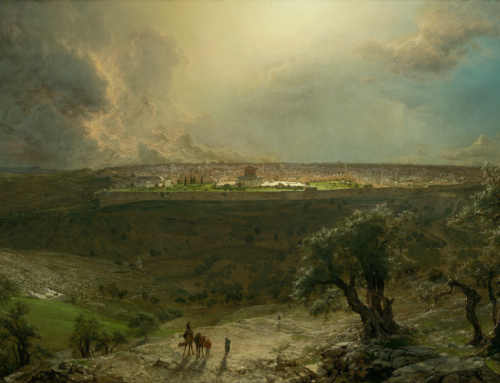Day of wrath and doom impending,
David’s word with Sibyl’s blending,
Heaven and earth in ashes ending!
These dramatic lines introduce one of western culture’s most memorable pieces of music—the Dies Irae. Originally a poetic sequence for use in the funeral liturgy, the text has been adopted for original works by Mozart, Verdi, Dvořák, and others. Centuries of creative expression have flowered from this simple chant piece!
With hundreds of such chants extant during the Middle Ages, why was this particular work enshrined in western musical tradition? The poem’s epic scope certainly plays a part—no piece beginning “Day of wrath!” would be confused for a lullaby. However, the piece is not only epic, but challenging, like the Last Judgment it describes so vividly. If a supervisor’s visit compels us to give an account of our work, how much more so with God, to Whom we owe a total account?
While the Creed promises that Christ will judge the living and the dead, He will not wield that power alone—the Apostles are promised that they will judge the twelve tribes of Israel (Lk 22:30). St. Paul, possibly remembering Christ’s words, is scandalized by the Corinthians who turn to outsiders to settle their disputes, since they themselves will judge the angels (1 Cor 6:2).
On this coming Election Day, we will act as judges in a less dramatic way. Both parties have framed this contest as determining whether we will be “dragged back to the fifties” or “reintroduced to the problems of the sixties.”
These arguments would have been laughable to the early twentieth-century journalist and author G.K. Chesterton, since they label the past solely as a problem. Chesterton didn’t deny that there were issues—in his view, politics was often a choice between progressives, who made new mistakes, and conservatives, who repeated the same mistakes. Even so, he understood that the past bequeaths us a legacy which, if abandoned, would be to our detriment.
The biggest political question of Chesterton’s time was women’s suffrage, but he thought even this a minor controversy compared to the oft-impugned voice of a much larger constituency. He writes:
Tradition means giving votes to the most obscure of all classes, our ancestors. It is the democracy of the dead. Tradition refuses to submit to the small and arrogant oligarchy of those who merely happen to be walking about. All democrats object to men being disqualified by the accident of birth; tradition objects to their being disqualified by the accident of death . . . I, at any rate, cannot separate the two ideas of democracy and tradition; it seems evident to me that they are the same idea.
For Chesterton, the dead are not to vote as if they were living (that would be Chicago politics), but their practices should weighed equally with those of the living.
But isn’t it naïve to consider our lapsed traditions as serious options? Isn’t it true that you can’t turn back the clock? Chesterton’s answer:
The simple and obvious answer is ‘You can.’ A clock, being a piece of human construction, can be restored by the human finger to any figure or hour. In the same way society, being a piece of human construction, can be reconstructed upon any plan that has ever existed.
After all, we turn back the clock every year. Still, while this idea of preserving our seemingly obsolete traditions might appear fantastic, Chesterton offers a practical reason to do so:
. . . let us say, for the sake of simplicity, a fence or gate [is] erected across a road. The more modern type of reformer goes gaily up to it and says, “I don’t see the use of this; let us clear it away.” To which the more intelligent type of reformer will do well to answer: “If you don’t see the use of it, I certainly won’t let you clear it away. Go away and think. Then, when you can come back and tell me that you do see the use of it, I may allow you to destroy it.
How are we to know the consequences of removing a policy if its fundamental purpose remains unknown? At this juncture, there is immense political pressure to sweep away traditions, but if tradition is unthinkingly abandoned for an unproven and untested promise of progress, we run the risk of jettisoning the better judgment of our predecessors.
On All Souls’ Day, as we petition God for mercy on the beloved dead, it seems proper also to safeguard their legacy. As Mark Antony warns in his eulogy for Caesar, “the evil men do lives after them; the good is oft interred with their bones.”
Christ as judge will not allow death the last word, just as He wouldn’t produce a sign for those incapable of understanding it:
The men of Nineveh will arise at the judgment with this generation and condemn it; for they repented at the preaching of Jonah, and behold, something greater than Jonah is here. (Lk 11:32)
In answering this call to conversion, may our nation echo Carl Schurz: “My country, right or wrong; if right, to be kept right; and if wrong, to be set right.”
✠
Photo by Luca Bravo







